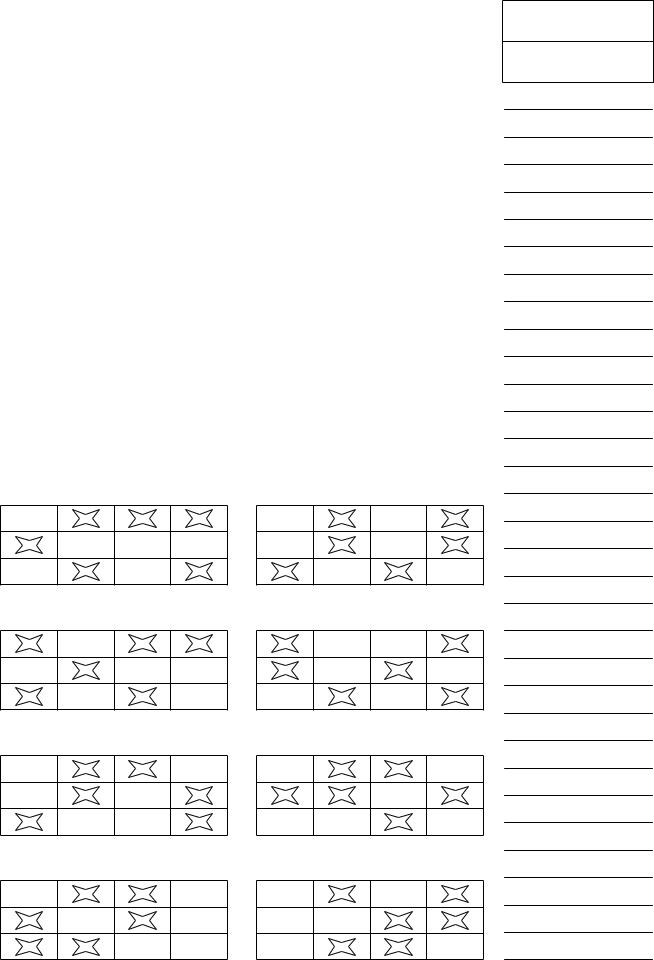
практика / 0917383_D95BB_kiktenko_t_m_angliyska_mova_6_klas_za_pidruchnikom_o_d_karp
.pdf
Lesson 14
Home Reading. The Ant and the Grasshopper
Цілі: вдосконалювати навички читання, мовлення, уживання в мовленні граматичної структури Past Simple і модальних дієслів; формувати лексичні навички; розвивати логічне мислення.
Procedure
1.Warm-up
1)What is the story about?
2)What are the main characters?
3)Do you know a Ukrainian story which is similar to this one?
2.Speaking True or False
Say which of these statements are true and which are false.
1)The ant played a musical instrument.
2)The grasshopper was lazy.
3)The grasshopper liked music very much.
4)The grasshopper was busy with carrying food.
5)The ant worked hard.
6)The grasshopper was cheerful even in autumn.
7)When winter came the ant was OK.
8)The ant was glad to see the grasshopper in his anthill.
3.Writing
Put the sentences into the correct order.
1)When the winter arrived the grasshopper stopped playing his violin.
2)The ant didn’t help the grasshopper.
3)She carried food to the anthill.
4)The ant didn’t like singing and dancing.
5)The ant was very different from the grasshopper.
6)The grasshopper came to the ant’s house. Key: 5, 3, 4, 1, 6, 2.
4.Reading
Broken sentences
Cut out and shuffle the parts of the sentences. Students in pairs have to sort out the cards to make up the sentences.
The grasshopper didn’t work and… |
…played his violin all the time |
|
|
The ant worked hard from… |
…morning till night |
|
|
The grasshopper was cheerful and |
…at the ant |
laughed… |
|
|
|
The grasshopper sang and danced… |
…in autumn too |
|
|
The grasshopper came to the anthill… |
…because he was very angry |
|
|
The ant didn’t want to help the grass- |
…because he laughed at him in the |
hopper … |
summer |
|
|
Клас
Дата
31

5. Speaking
Answer the questions.
1)What musical instrument did grasshopper play?
2)Did he love summer?
3)What did he do in summer?
4)Did the ant live far from the grasshopper?
5)Why do we say that the ant was different from the grasshopper?
6)What did the ant do?
7)Why did the grasshopper laugh at the ant?
8)What advice did the ant give to the grasshopper?
9)Did the grasshopper follow the advice?
10)What happened when the winter came?
11)Why did the grasshopper come to the anthill?
12)What did he ask?
13)Why didn’t the ant help him?
14)What is the best moral of the story? Prove your opinion.
6. Summary
Retell the story from the part of
a)the ant;
b)the grasshopper.
7.Homework
Get ready with the next home reading (p. 157).
32

Unit 2. School Life
Lesson 15
I love school. And you?
Цілі:формуватинавичкивживанняграматичноїструктуриPresentPerfect у писемному й усному мовленні; удосконалювати навички усного мовлення й аудіювання, уживання лексичних одиниць; розвивати мовну здогадку й мовленнєву реакцію учнів; виховувати зацікавленість у розширенні своїх знань.
Procedure
1. Warm-up
Answer the questions.
1)Do you want to know as much as possible about things around us?
2)What helps you to get more information about the world?
Puzzle
Fill in the names of your school subjects and you will solve this puzzle.
E
N
G
L
I
S
H
Key: Geography, Ukrainian, German, Literature, Drawing, Maths,
History.
2. Listening
Ask pupils to listen to the children’s opinions about school and agree or disagree with them.
(Write on the board the prompts to help pupils to express their opinions after each text: Yes! I think so!.. No! I can’t say… I don’t know! I’m not sure that…)
What do these children feel about school?
T i m. Our school is not the best, but I like it. I’m in the football team. It’s fun. Our hockey team is the best in the city.
T r a c y. My dad always says, “Homework first”. I hate it. It’s so boring. The only thing at school that I like to do is to draw.
H e l e n. Oh, school is the best thing in the world. I’m doing well a lot of subjects. I get only good marks. I see friends that I like very much.
W i l l. I don’t like school very much. I have some problems with languages. Besides, I’m always afraid that the teacher can call to my parents.
3. Presentation of Present Perfect
Walk around the class, performing different actions and then commenting on them using the present perfect, e.g. I’ve opened the door. I’ve closed my book. I’ve dropped my pen. I’ve sat down. Ask students to do different actions and answer the question: What have you done?
Клас
Дата
33

e.g. T. What have you done? S. I’ve written my name.
Then get students to ask each other about a third student, e.g. S1. What has Anton done?
S2. He has just opened his book.
Explain the rule (page 28), write example sentences on the board and practice them chorally and individually.
4. Reading
Read the dialogue (ex .1, p. 28) and find the present perfect forms. Read them aloud. Make your own examples with these forms using the following expressions: learnthenewwords,dothesum,drawthepicture, read the text, learn the rule, learn the poem, search the information about, write the composition. Explain the new words to hurry and I hope so. Find them in the text and give your own examples.
Make up your own dialogue.
5. Writing
Use Present Perfect to make positive sentences.
1)They / buy / a new house
2)You / eat / four bananas!
3)We / finish / our work
4)He / lose/ his key.
5)She / have / a shower.
Use the Present Perfect to make questions.
1)you / see / Jeremy?
2)he / read / this book?
3)they / visit / this museum?
4)she / make / pizza?
5)you / write / this article?
6.Speaking
Do Ex. 2, p. 28.
7. Summary
Name a subject and ask pupils to say that they have done something connected with it.
For example: Maths — I’ve done the sum.
1)Ukrainian — write the letter,
2)Art — draw the poster,
3)Literature — read the story,
4)English — learn the new words,
5)Geography — find this river on the map,
6)History — fill in the chart,
7)Computer Studies — make a presentation,
8)German — make up the dialogue.
8.Homework
Your friend has just come back from an incredible country. Ask him 6 questions about his experience using the following words: eat, drink, see, visit, speak, ride, fly. E.g. Have you eaten crocodile meat?
34

Lesson 16
Who has done the homework?
Цілі: вдосконалювати навички усного мовлення з опорою на лексикограматичні структури, навички вживання граматичної структури Present Perfect; розвивати культуру спілкування; виховувати доброзичливе ставлення до співрозмовника.
Procedure
1.Warm-up Work in pairs.
Broken dialogues. Match the parts of the dialogues.
1) |
Let’s have some coffee. |
a) |
No, I was very busy yesterday. |
2) |
Do you know anything about Pam? |
b) |
I have forgotten to learn the |
3) |
Have you written the composition? |
|
new words |
4) |
The information is on your table. |
c) |
Have you printed it? |
5) |
Why are you so sad? |
d) |
Oh no, thank you, I have had |
6) |
Have you done the sum? |
|
two cups of tea |
|
|
e) |
Yes, it was not difficult |
|
|
f) |
Yes, I’ve got an e-mail from her |
|
|
|
|
Key: 1 d, 2 f, 3 a, 4 c, 5 b, 6 e.
2. Speaking
Let’s talk about unusual experience.
1)Have you eaten crocodile meat?
2)Have you spoken to a queen?
3)Have you flown in a helicopter?
4)Have you drunk coconut milk?
5)Have you seen a falling star?
6)Have you visited Nature Museum?
7)Have you ridden a horse (camel)?
3.Practise Present Perfect
Make up sentences as quickly as you can.
T e a c h e r. He / choose / a book.
P u p i l. He has chosen a book.
1)They / win / the game.
2)My / sister / pass / the exam.
3)I / understand / the rule.
4)We / make / our school newspaper.
5)She / buy / a new reference book.
6)The teacher / check / the exercise.
7)I / connect / with my friends.
8)He / send / his e-mail.
9)She / complete / the form.
10)They / meet / their friends.
11)The librarian / help / me.
12)My friend / give / me a good piece of advice.
13)I / use / Helpful Tips in this lesson.
14)I / join / this team.
15)My friend / suggest / to do the homework together.
Клас
Дата
35

4. Reading and speaking
Read the dialogue in Ex. 3 and answer the questions in Ex. 4, p. 29. Explain new expressions to be afraid of and Lazy bone!
Work in pairs.
Practise short dialogues:
—Have you learnt the Ukrainian poem for today?
—I’m afraid I haven’t. I was in no mood to learn anything.
—Lazy bone!
Work in groups of three.
Ask pupils to make up their own dialogues.
Give each group a set of the handout and demonstrate first to show the class what they have to do.
Pupil 1 |
Pupil 2 |
Pupil 3 |
You haven’t done your |
You have forgotten to do |
You haven’t done your |
English. You had a |
your Maths. You were |
History. Ask to help you |
toothache |
busy with your computer |
with it |
|
game |
|
Pupil 1 |
Pupil 2 |
Pupil 3 |
You haven’t done your |
You have forgotten to |
You haven’t learnt the |
Nature Studies. You |
search the necessary in- |
new words. Ask to help |
were away at the week- |
formation on the compu- |
you with it |
end |
ter. You were busy with |
|
|
your bike |
|
Pupil 1 |
Pupil 2 |
Pupil 3 |
You haven’t written the |
You have forgotten to |
You haven’t done your |
Ukrainian composition. |
learn the new rule. You |
German. Ask to help |
You had an earache |
were busy with shopping |
you with it |
Read helpful tips and answer the question:
• Why should you make grammar rules by yourself?
6.Summary
Read the text and circle the verbs that are in the present perfect.
My friend is travelling by ship. He has a nice cabin. He’s visited some countries in Europe but he hasn’t been to Turkey. He has to talk to lots of people but he hasn’t met a pop star. He has ridden a camel in Egypt. He hasn’t swum in the sea because he’s left his swimming costume at home. But he has a good time.
7. Homework
Write a short note to your mother about what you have done at home before going out.
36

Lesson 17
Have you done your English?
Цілі: вдосконалювати вживання граматичної структури Present Perfect зі словами already, yet, ever; удосконалювати навички письма; розвивати увагу дітей та кмітливість.
Procedure
1. Warm-up
Let’s revise irregular verbs.
Cut out the cards and give a card to each student. Each card consists of 6 irregular verbs. As each verb is called out the students cross them out on their cards. At the end of the game the winning student reads out three forms of the verbs on his/her card. You may call the words out of the teacher’s board (English or L1) or cut it into 20 squares, mix them up and draw them out one by one.
Teacher’s board
Go |
Sing |
Eat |
Take |
Make |
Do |
|
|
|
|
|
|
Write |
Learn |
Wear |
Become |
Give |
Run |
|
|
|
|
|
|
Bring |
Begin |
Fly |
Drink |
Sleep |
Buy |
|
|
|
|
|
|
Catch |
Forget |
Leave |
Hit |
Swim |
Break |
|
|
|
|
|
|
Card 1
go |
|
|
sing |
take |
do |
eat |
make |
|
Card 3
bring |
|
|
begin |
fly |
go |
drink |
|
run |
Card 5
catch |
write |
forget |
sing |
leave |
sleep |
Card 7
break |
go |
bring |
sleep |
catch |
swim |
Card 2
write |
wear |
learn |
take |
give |
become |
Card 4
do |
run |
sleep |
write |
buy |
sing |
Card 6
hit |
|
leave |
|
|
forget |
drink |
eat |
swim |
Card 8
begin |
hit |
break |
learn |
forget |
make |
Клас
Дата
37

Card 9
bring buy
go
drink wear run
Card 10
break take
become eat
fly run
2. Speaking
Explain using the words just, already. Help pupils with the irregular verbs they need for their dialogues.
Work in pairs.
Make up short dialogues, use the sentences from your homework.
Example:
M o t h e r. Anton, sweep the floor, please. Y o u. I have already (just) swept it.
3. Writing
Do Ex. 1, p. 30. Then practise the pronunciation of the verbs chorally and individually.
4. Practise
Practise the negative form of Present Perfect using yet and before. Do Ex. 2, 3, p. 30.
5. Listening and speaking
Explain how to make up questions in the Present Perfect using ever. Write down the prompts on the board and then pupils in chain ask
and answer about their experience.
Example:
S1. Have you ever been to Kyiv?  S2. Yes, I have. Have you ever played with a bear?
S2. Yes, I have. Have you ever played with a bear?  S3. No, I haven’t. Have you ever…?
S3. No, I haven’t. Have you ever…? 
Prompts: read / a comic
1)have / an operation
2)see / a shark
3)eat / an English pudding
4)see / a rainbow
5)make / an omelette
6)break / your arm
7)hear / about unusual things
8)visit / a dentist
9)swim / in the ocean
6.Writing
Do Ex. 4, p. 31.
7. Summary
Using the previous prompts say how many times you have done these things in your life. You may add your own examples.
I’ve never been to Kyiv. or I’ve been to Kyiv two times.
8. Homework
Your friend asks you if you are ready with your homework for tomorrow. Write a few sentences what you have already done and what you haven’t done yet.
38

Lesson 18
Extra-school activities
Цілі: вдосконалювати навички читання, уживання нової лексики в граматичній структурі Present Perfect; розвивати пам’ять, творчий характер; виховувати доброзичливе ставлення до співрозмовника.
Procedure
1. Warm-up
Let’s revise irregular verbs.
Cut out the cards and give a card to each student. Each card consists of 6 irregular verbs. As each verb is called out the students cross them out on their cards. At the end of the game the winning student reads out three forms of the verbs on his/her card. You may call the words out of the teacher’s board (English or L1) or cut it into 20 squares, mix them up and draw them out one by one.
Teacher’s board
Build |
Cost |
Hurt |
Choose |
Cut |
Feel |
|
|
|
|
|
|
Fall |
Drive |
Feed |
Find |
Get |
Have |
|
|
|
|
|
|
Hide |
Keep |
Know |
Meet |
Pay |
Lose |
|
|
|
|
|
|
Win |
Ride |
Read |
See |
Put |
Think |
|
|
|
|
|
|
2.Speaking Work in pairs.
Make up short dialogues. Use the sentences from your homework.
Example:
—Have you done your History for today?
—Yes, I have. And what about you? Have you written down the new words into the vocabulary?
3.Reading
Read the text (p.32) and say what it is about.
Find the Present Perfect form verbs and write them down into your exercise-books. Then read the sentences with them.
Find the new words from New Vocabulary Box in the text, translate them and use them in the other sentences.
1)Our team __ very well yesterday.
2)I sing in our school __ twice a week.
3)Our school __ helps us with any problems.
4)We have got different __ __ every day.
5)My friend plays the violin in our school __ which often __ concerts.
6)Are you hungry? I have already __ .
7)My sister always buys __ magazines.
8)I’ve just visited __ of black and white photographs.
Key: performed, choir, principal, extra-school activities, orchestra,
holds, served food, fashion, an exhibition. Do Ex. 2, p. 33.
4.Listening and speaking Work in pairs.
Make up short dialogues using prompts in Ex. 3, p. 33.
Клас
Дата
39

5. Summary
What extra-school activities did you have during the last school year?
6. Homework
Do Ex. 4, p. 33.
Card 1
build |
|
|
win |
get |
read |
hide |
choose |
|
Card 3
fall |
|
|
see |
have |
think |
drive |
|
feed |
Card 5
ride |
choose |
keep |
know |
build |
pay |
Card 7
have |
know |
find |
fall |
hide |
put |
Card 9
feed |
cut |
|
|
|
|
|
put |
|
drive |
lose |
fall |
Card 2
keep |
meet |
hurt |
feel |
see |
think |
Card 4
cost |
keep |
build |
get |
read |
think |
Card 6
find |
|
meet |
|
|
feel |
win |
cost |
ride |
Card 8
lose |
hurt |
get |
have |
cost |
drive |
Card 10
choose hide |
|
cut |
feel |
know |
pay |
40
